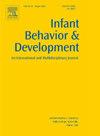11 个月大婴儿辅助行走的社会动力。
IF 2
3区 心理学
Q3 PSYCHOLOGY, DEVELOPMENTAL
引用次数: 0
摘要
在婴儿独立行走之前,他们会牵着看护人的手、推着有轮子的学步车、沿着墙壁或家具 "巡游",在支持下直立行走。照顾者和婴儿在多大程度上参与了这些活动,这些辅助行走的经历与独立行走状态是否有关?为了解决这些问题,我们对 50 名 11 个月大的婴儿及其母亲在日常生活中的辅助行走进行了评估。对于每次辅助行走,编码员都会对辅助类型、辅助行走的频率以及婴儿每次行走的步数进行评分。母亲对婴儿独立行走的起始年龄进行前瞻性跟踪,研究人员使用标准化任务对婴儿的行走技能进行验证。由儿童控制的辅助行走次数较多的婴儿比由儿童控制的辅助行走次数较少的婴儿更早实现独立行走。但是,辅助行走的经验并不能预测独立行走的熟练程度,这表明这两种运动是不同的。这些数据强调了运动行为经验的作用,并表明并非所有经验都同样有效。本文章由计算机程序翻译,如有差异,请以英文原文为准。
Social dynamics of supported walking in 11-month-old infants
Before infants walk independently, they move upright with support by holding caregivers’ hands, pushing a wheeled walker, and “cruising” along walls or furniture. To what extent do caregivers and infants engage in these activities and do these experiences with supported walking relate to independent walking status? To address these questions, we assessed supported walking in 50 11-month-olds and their mothers in the context of everyday routines. For each bout of supported walking, coders scored the type of support, frequency of supported bouts, and the number of steps infants took per bout. Mothers tracked onset ages for independent walking prospectively, and researchers verified infants’ walking skill using a standardized task. Infants who produced more child-controlled supported walking achieved independent walking earlier than infants who produced less child-controlled supported walking. But, supported walking experience did not predict proficiency of independent walking, suggesting that the two types of locomotion are distinct. These data highlight the role of experience of locomotor behaviors and indicate that not all experience is equally effective.
求助全文
通过发布文献求助,成功后即可免费获取论文全文。
去求助
来源期刊

Infant Behavior & Development
PSYCHOLOGY, DEVELOPMENTAL-
CiteScore
4.10
自引率
4.80%
发文量
94
期刊介绍:
Infant Behavior & Development publishes empirical (fundamental and clinical), theoretical, methodological and review papers. Brief reports dealing with behavioral development during infancy (up to 3 years) will also be considered. Papers of an inter- and multidisciplinary nature, for example neuroscience, non-linear dynamics and modelling approaches, are particularly encouraged. Areas covered by the journal include cognitive development, emotional development, perception, perception-action coupling, motor development and socialisation.
 求助内容:
求助内容: 应助结果提醒方式:
应助结果提醒方式:


